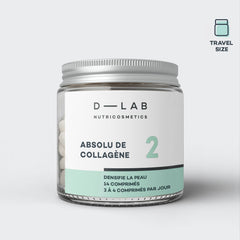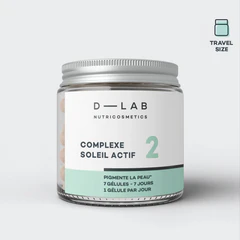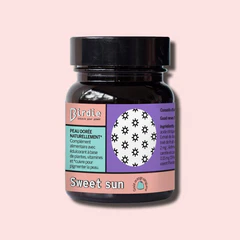Melanin, ce pigment mystérieux qui donne à notre peau sa couleur unique, est bien plus qu'une simple caractéristique esthétique.
It's a fundamental part of our identity and skin health. Melanin is responsible for the infinite palette of shades that distinguish individuals around the world, from the fairest to the darkest complexion.
Yet few people really understand the crucial role this pigment plays in our bodies.
This article aims to shed some light on melanin, explaining its origin, functions and influence on skin pigmentation.
I. What is melanin?
Melanin is produced by specialized cells called melanocytes, present in the epidermis of our skin. It comes in different types, principally eumelanin, responsible for brown and black tones, and pheomelanin, which produces lighter tones ranging from red to blond. The melanin production process is complex and regulated by various factors, including genetic, hormonal and environmental factors.
In addition to its aesthetic role, melanin plays a crucial role in protecting our skin from the sun's ultraviolet (UV) rays. It acts as a natural barrier, absorbing UV rays and preventing damage caused by excessive exposure.
However, melanin is not limited to sun protection. It also influences hair and skin color, as well as other ethnic variations observed around the world.
The production of melanin is a complex process that can be influenced by a variety of factors. Heredity plays a major role in determining skin pigmentation, while sun exposure stimulates melanin production in response to UV rays. Specific medical conditions can also lead to melanin disorderssuch as hyperpigmentation and hypopigmentation.
It is essential to taking care of our melanin and protect our skin to maintain balanced pigmentation and optimal skin health.
Using the right sun protection products, as well as skincare specifically designed to maintain melanin balance, are essential measures to prevent UV damage and preserve our skin's natural beauty.
When we expose our skin to the sun, one of the most visible effects is a tan. This phenomenon is closely linked to melanin. When UV rays reach the skin, melanocytes are stimulated to produce more melanin to protect skin cells from UV damage. This increased melanin production leads to increased skin pigmentation, resulting in a tanned complexion.
However, it's important to stress that tanning is not a sign of healthy skin. It is, in fact, the body's defense response to harmful UV rays. While tanning may give the appearance of healthier skin, it should not be considered sufficient protection against sun damage. Excessive, unprotected UV exposure can lead to long-term harmful effects, such as premature skin aging and an increased risk of skin cancer. It is therefore essential to always use adequate sun protection, even when our skin is tanned, to preserve our skin's health.
II. Melanin functions
Protecting the skin
Melanin is a fundamental pigment that plays an essential role in skin coloration. It is responsible for the diversity of skin tones observed in individuals around the world. But beyond its aesthetic function, melanin also plays a number of other important roles in our bodies.
Melanin's first essential function is to protect the skin against the sun's harmful ultraviolet (UV) rays. By acting as a natural shield, it absorbs UV rays, limiting their penetration into the deeper layers of the skin. This property of melanin reduces the risk of burns, cell damage and skin cancer induced by excessive sun exposure. People with more melanin in their skin therefore benefit from higher natural protection against the harmful effects of UV rays.

In addition to its photo-protective role, melanin is also involved in regulating body temperature.
By absorbing the sun's heat, it helps maintain the body's internal temperature at an optimal level.
Individuals with darker skin, which contains a greater quantity of melanin, tend to be more resistant to high temperatures and protect themselves from heatstroke.
Healing and prevention of oxidative damage
Melanin also plays a crucial role in wound healing and protection against skin infections. When the skin is injured, skin cells called melanocytes produce more melanin to form a protective barrier. This barrier reduces the risk of infection and promotes rapid repair of damaged tissue. In this way, melanin plays an active role in the skin's healing process and its ability to defend itself against external pathogens.
In addition, recent research suggests that melanin may also play a role in preventing oxidative damage caused by free radicals. Free radicals are unstable molecules that can damage cells and contribute to the aging process. Thanks to its antioxidant properties, melanin can help neutralize these free radicals and prevent associated cellular damage.
III. Melanin Absolute to pigment and intensify your tan
Our brand-new, innovativeAbsolu de Mélanine formula, concentrated in keratin hydrolysate, is naturally rich in melanin, an essential pigment and source of copper that acts at the heart of our cells to naturally pigment the skin*, promote tanning*, regulate melanin secretion and protect the skin from the harmful effects of UV* rays.
This innovative formula provides a high dose of melanin-enriched keratin, perfectly assimilated to integrate into the process of melanogenesis, the process responsible for the skin's natural pigmentation. It also influences keratin synthesis, considerably improving skin quality. Thanks to its "ready-to-use" melanin, this formula naturally prepares the skin for UV* exposure, while accelerating and preserving the resulting tan*. Enriched with a synergistic antioxidant complex of vitamins C and E, the body recharges its natural defenses, which are depleted during UV exposure.
Our Melanin Absolute generates a significant increase in melanogenesis, leading to higher production of epidermal melanin, the pigment responsible for skin coloration. The result is immediate, long-lasting pigmentation for a tanned complexion all year round. Result: 4x faster tanning!
We know that skin aging is partly due to an excess of free radicals generated by UV, when we expose ourselves, our antioxidant defenses are no longer sufficient to fight them, which is why antioxidant supplementation is very important.
Our formula also contains vitamins C and E with strong antioxidant activity to protect the skin from free radicals induced by UV exposure. Free radicals are responsible for up to 80% of skin ageing, and are therefore strongly implicated in premature ageing. The combination of these vitamins synergistically boosts the body's natural antioxidant pool for a global action, protecting the skin from oxidative stress and delaying cutaneous aging.
Rich in ready-to-use melanin, Absolu de Mélanine helps improve skin quality. The selected keratin hydrolysate is made up of "ready-to-use" melanin, which naturally integrates into de novo pigmentation, and whose amino acids nourish the skin. Vitamin C is also involved in collagen synthesis, making skin more supple and radiant. It effectively influences keratin synthesis in the epidermis.
According to a clinical study* carried out in winter on 33 subjects who had not been exposed to the sun, our active ingredient enables immediate pigmentation of the skin after 10 days of treatment, thanks to improved availability of melanin in the skin, as well as an increasing intensification of tanning as the treatment progresses.
After 20 days, the level of melanin is significantly higher within two hours of exposure, protecting it better from the effects of UVA.
After 30 days of treatment, at a rate of 2 capsules per day, the tanning is increased by 217%.
*Clinical study conducted in winter on 33 phototype II and III subjects, with no sun exposure for at least 1 month before and during the entire study period, taking 650 mg of Melaline® per day for 30 days. Parameters assessed within the group, before and after dosing.

To conclude
In short, melanin goes far beyond its function as the pigment that colors our skin. It's essential to our bodies, providing protection from UV rays, regulating body temperature, promoting wound healing and preventing oxidative damage. Understanding the functions of melanin enables us to appreciate its essential role in our health and well-being, as well as the importance of skin tone diversity in our society.






